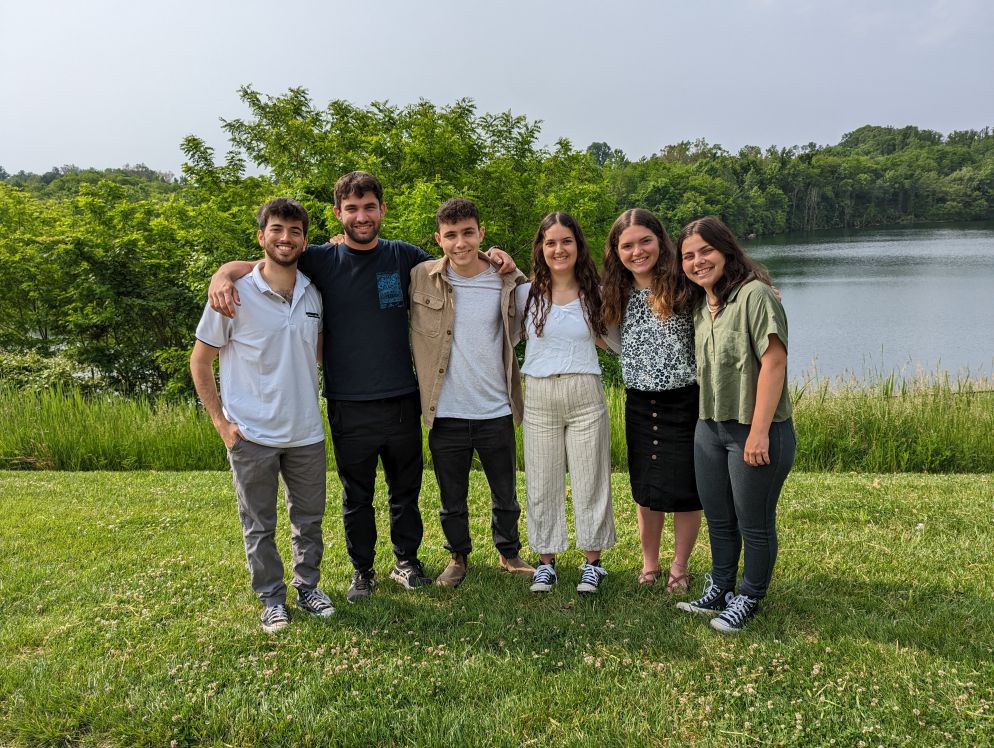For many teenagers, June marks the end of school and the beginning of summer.

But for the 2023 cohort of Shinshinim, it not only means saying goodbye to their friends and classmates, but also to their time in the United States.
The group of six Israeli students just out of high school were selected from a pool of over 7,000 potential applicants to spend a year abroad in Baltimore, with 180 of their fellow Shinshinim placed across the United States and all over the world. They elected to take a gap year between high school and their mandatory service in the Israel Defense Forces to live with local host families and engage in volunteer community service, acting as educators on Israeli history and culture.
This is the 15th year that Baltimore has hosted a cohort of Shinshinim. The program is a collaboration between the Jewish Agency for Israel and The Associated: Jewish Federation of Baltimore, with Jewish Educational Services helping facilitate it.
“Many teenagers around Israel try really hard to be accepted into this program,” said Rotem Karasik, one of the 2023 Baltimore Shinshinim. “It’s hard to actually get accepted into it.”
Karasik — along with Carmi Cohen, Eden Furman, Yinon Assraf, Yali Shapira and Amir Noy — make up this year’s Baltimore Shinshinim group. Since last September, they have been living with host families and helping teach at a variety of different schools and synagogues, including Ohr Chadash Academy, Krieger Schechter Day School and the Stoler Early Learning Center at the Rosenbloom Owings Mills JCC.
They also had the freedom to plan events focusing on different aspects of Israeli culture, such as an Israeli poetry night they held at Beth El Congregation.
“It was amazing to bring things we liked to the community, things that had a deep connection to Israel, like Israeli music and poetry,” Cohen said.
That flexibility was something they all described as a benefit of the program, as they were not tied to strict curricula and had ample opportunity to plan events and classes focusing on things they enjoy.
“What’s beautiful about this program is that there are a lot of options for our work,” Noy explained. “If we have an idea, it’ll usually be welcomed with open arms because everyone wants us to be involved in the community.”
All of the Shinshinim came from a variety of different backgrounds all across Israel — some are secular, while others were raised Orthodox. But they all found that the Jewish community in America is very different from Israel.
Some of them described Judaism in Israel as being a very black and white affair, where a person is either religious or they are not. But American Judaism has more gray areas, with people picking and choosing the Jewish traditions they want to uphold.
“I never felt as comfortable in a synagogue in Israel as I felt in one here,” Noy recalled. He was raised secularly in Israel, so learning about how Americans practice Judaism was a new experience for him. “It feels like no one is judging you for your lifestyle and how you practice Judaism. You can easily find yourself in every shul or synagogue you want to be a part of.”
It was an especially interesting year to represent Israel as the country was celebrating the 75th anniversary of its founding. Furman described how meaningful it was to see American Jews coming out to celebrate Israel on Yom Ha’atzmaut, Israel’s Independence Day.
“It was really powerful and touching to see so many people really caring about and celebrating Israel’s Independence Day,” she said. “That was the best part of the year for me.”
The Shinshinim hold an interesting position — when they are in America, they are ambassadors from Israel, sharing their experiences and culture. But when they return to Israel, they will be ambassadors of Baltimore and its Jewish community, representing it and bringing their stories of volunteering abroad back to their homeland.
This makes returning to Israel a bittersweet experience. Many of them miss their home, but will be sad to leave the U.S.
“It’ll be strange to come back to Israel because we’ve been treated like rock stars in the community,” Noy said. “Because everyone loves Israel so much, and for them, we’re their connection to Israel.”
The Shinshinim agreed that they would be open to visiting the U.S. again in the future because they enjoyed their time in the country, formed meaningful connections and learned a lot.
“During our time here, we stayed with host families,” Karasik said. “Now I feel that I have multiple families. If they ever visited Israel, they would always be welcome in my house. We have a strong connection. I feel that they are my family and that I am their family.”







